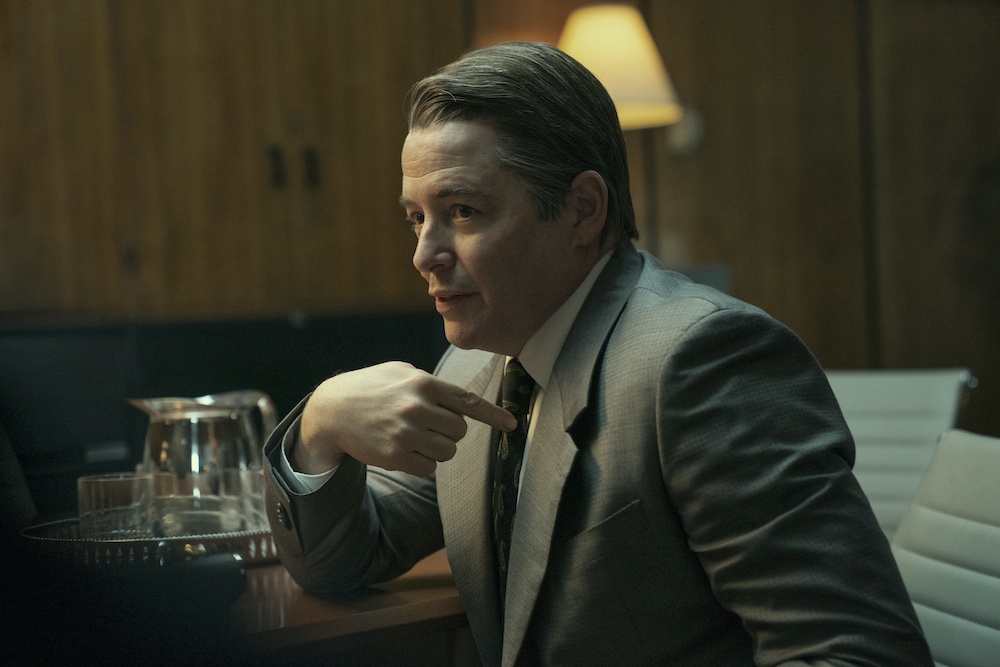Netflix’s limited drama series ‘Painkiller’ is a fictionalized retelling of the opioid crisis. The show traces the origins of OxyContin, which is rolled into the market as a potent painkiller with little to no chance of causing addiction. This, however, turns out to be a lie when thousands of people find themselves hooked to OxyContin after getting it prescribed by their doctors. Purdue Pharma, the distributor of the prescription drug, lands itself in legal trouble when the effects of OxyContin are made public.
The leader of Purdue, Richard Sackler, has to resort to all sorts of tricks to keep OxyContin in the market while preserving his family’s reputation. It is a rather stressful job to prove that you’ve done nothing wrong when you know that you are the root of the problem that has turned into an epidemic. In several scenes in the show, including the first and last, Richard hears smoke alarms in his house. What does it signify? Let’s find out.
Significance of Smoke Alarms

‘Painkiller’ opens with Richard Sackler in his huge mansion. He is awakened by the incessant sound of a smoke alarm going off in some part of his house. He searches for the alarm in the entire house, and when he finds the one that’s been sounding off, he does whatever he can to take it out. It’s too high to reach, so he throws stuff at it, hoping to hit the target. Eventually, one of his employees shows up and rips the alarm off, shutting it for good.
Throughout the series, the alarms go off repeatedly. A closer look at the timing reveals that the alarm always sounds when Richard and Purdue Pharma are in a crisis. In the first scene, the alarm goes off on what Richard calls an important day. It is later revealed that this was the day of his deposition when everything fell apart for him.
The story goes in flashbacks, and we get the whole picture from the beginning of the crisis through Edie Flowers. Following the death of Arthur Sackler, his family discovered that he had left them in massive debt. They would have to sell most of their ventures to get out of it. Richard advises they should let go of other things but keep Purdue Pharma. Creating and selling medications is how Arthur made his money, and Richard thinks that this is what’ll get them back on their feet.
Richard knows they will have to roll out something new and unprecedented and market it like never before. He comes up with OxyContin and invests everything into it. When the time comes to get it in the market, he hits a roadblock in the form of Curtis Wright at the FDA. This is when the smoke alarms go off. Wright refuses to approve the drug, without which OxyContin cannot be legally sold as a prescription medicine.

It is a huge problem, but Richard is not the one to give up so easily. With his uncle, Arthur, whispering into his ears, Richard does everything, from stroking Wright’s ego to bribing him to get him to approve OxyContin’s sale. Eventually, he succeeds, Wright is brought on board Purdue, and OxyContin is ready to be sold. A team of dedicated salespeople is set out into different parts of the country, where they convince the doctors to prescribe OxyContin to everyone with any kind of pain. The concerns about addiction are shrugged off, and soon, profits start to roll in for Purdue.
The next time the alarms go off in Richard’s house is when the concerns start to pour in about the abuse of OxyContin and how it is being used as a common drug by addicts. To save the company, he twists the narrative. Instead of taking responsibility, the company puts the blame on addicts. Still, Arthur warns him that things will not settle so easily. OxyContin is much bigger than Valium or Xanax, or any other prescription drug in the same family. Soon enough, the law catches on to them, and the executives of Purdue are called to testify before Congress. Edie Flowers catches them in a lie, leading the US Attorney’s office to build a case against Purdue.
John Brownlee and his team approach Howard Udell, Michael Friedman, and Paul Goldenheim to cooperate or face jail time. The smoke alarms go off as the executives panic, but Richard knows that nothing is lost just yet. He hires the best lawyers money can buy and uses his connections to force the prosecution into a settlement, which gives Purdue a lot of leeway. They get away with one count of misdemeanor misbranding, and the rest of the evidence against them is buried as a part of the settlement.

In all these times, there is only one thing that Richard is focused on. He wants to protect the family name. He never gets a Sackler to testify or appear before the court or any lawyer. He doesn’t have Purdue take the blame for anything. He is focused on saving his family’s name and protecting the legacy of the Sacklers, which is what he thinks Arthur wants from him. Eventually, however, things get out of hand.
In 2019, Richard sits down for a deposition, following which Purdue files for bankruptcy, and the Sacklers forfeit their claim on the company. Still, they never confess to anything, and once again, instead of going to prison, they reach a settlement worth billions of dollars, which Richard claims isn’t that much. This settlement also ensures that the family would get immunity from any further investigations, and no one would come after them again. However, for Arthur, the settlement means that the Sackler name has been destroyed.
In the final scene, when Richard hears the smoke alarms go off once again, he is not bothered by them like he was used to. This shows that he has washed his hands off anything that might constitute a crisis. His job was to save the family, and he has done that. What happens to Purdue and whatever OxyContin did to thousands of people is none of his concern. With the settlement, he has ensured his survival. He doesn’t care about any fires and what destruction they might cause anymore. It’s not his job to care about any crisis anymore.
Read More: Painkiller Ending, Explained: Does Glen Die?


You must be logged in to post a comment.